LocalLink Hub podcast
Hello. Welcome to LocalLink Hub’s podcast, a show with local impact for global change. Locallink Hub is the localization and partnership initiative for Terre des hommes. Local Link Hub is a global online platform that provides free e-learning and capacity development resources for local and national actors. Through this platform, Terre des hommes aims to contribute to a power shift to localize aid, making the provision of aid more equal and sustainable. We support our local partners to become better prepared for future crisis. This project is funded by the Samara Foundation.
Episodes

Friday Nov 14, 2025
Friday Nov 14, 2025
In this episode of Local Link Hub, Enikő Vass chats with Camille Errard from CartONG about a common challenge: small NGOs drowning in data but lacking resources. Camille explains that data isn’t scary -it’s just facts that can turn into knowledge when used well. She shares a story from Iraq where a team spent two stressful days on reports until they organized their data. After a few changes, the same work took only one hour.
Her advice? Start simple. Use tools like Excel or KoboToolbox, set clear rules, and train your team. Choose tools that fit your needs, not the fanciest ones. Keep data safe with good habits, and remember: donors should support training and basic tech.
Camille’s final tip: begin with one mobile data collection tool and a simple database. Build a strong base, then grow.
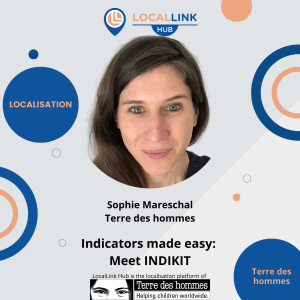
Monday Apr 14, 2025
Monday Apr 14, 2025
Podcast Episode: Indicators Made Easy - Meet INDIKIT
Welcome to the Local Link Hub podcast, a show with local impact for global change! In this episode, we explore the world of program indicators with Sophie Mareschal, Quality and Accountability Global Advisor at Terre des hommes. Sophie brings over 15 years of experience in monitoring and evaluation, having worked with organizations like UNICEF, UN Women, and Oxfam.
Episode Highlights:
Introduction to INDIKIT: Sophie explains what INDIKIT is, its origins, and how it has been customized for Terre des hommes.
Importance of Indicators: Learn why having a standardized set of indicators is crucial for measuring program success and ensuring quality.
Development Process: Discover the extensive work behind creating the INDIKIT library, including prioritizing indicators and developing measurement guidance.
Usage and Benefits: Understand how INDIKIT helps TDH staff and partners show collective impact, improve monitoring and evaluation techniques, and enhance professional practices.
Future Plans: Sophie shares insights on how INDIKIT will continue to evolve with user feedback and additional indicators.
For more information about Terre des hommes initiatives, visit locallink.childhub.org. Share your thoughts and comments via social media or email us at locallink.childhub.org.
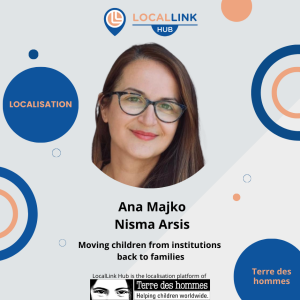
Tuesday Mar 04, 2025
Tuesday Mar 04, 2025
In this episode of the LocalLink Hub podcast, we explore the inspiring work of Nisma Arsis, an organization dedicated to protecting vulnerable children in Albania. Our guest, Anna Majko, Executive Director of Nisma Arsis, shares her journey from studying psychology to becoming a leader in child protection. With over 13 years of experience, she has played a key role in supporting children affected by trafficking, abuse, and exploitation. She explains how her organization started by helping children in street situations and has since expanded to offer a range of services, including community centers, emergency shelters, and family support programs.
A major focus of our discussion is the importance of moving children out of institutions and back into family care. Anna shares how Nisma Arsis, in collaboration with local authorities, has been working to close residential care institutions and develop community-based services that keep children with their families. She explains why institutional care is not a suitable solution for children and how supporting families directly can lead to better outcomes. By working closely with municipalities and advocating for foster care systems, they are making real progress in shifting child protection policies in Albania.
We also touch on the complex and sensitive issue of human trafficking. Anna describes the challenges of identifying and rescuing children who are at risk, often due to poverty and exploitation by criminal networks. She highlights the difficulties of reintegrating these children when systemic gaps, such as a lack of foster care options and social services, make it hard to provide long-term solutions. Despite these obstacles, Nisma Arsis works tirelessly with law enforcement and social workers to ensure that trafficked children receive the protection and care they need.
Finally, Anna shares a heartwarming success story of how Nisma Arsis helped close two institutions and transition children back to family-based care. She discusses the positive impact this change has had on children’s lives and the ongoing efforts to expand this model. This episode is a powerful reminder that every child deserves a safe and loving home, and that local organizations like Nisma Arsis are making a real difference in their communities. Tune in to hear more about their work, the challenges they face, and their vision for a future where no child grows up in an institution.
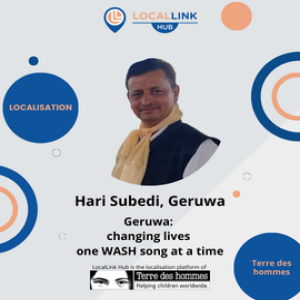
Friday Jan 24, 2025
Friday Jan 24, 2025
On May 11, 2023 Thakurbaba municipality became the first in Nepal to be recognized as a Total Handwashing Municipality. They started with only 6,7% of homes having accessible handwashing stations. To achieve this Susila, a Wash campaigner with a beautiful handwashing song and 97 more like of her helped. An also Geruwa, the local partner of Tdh was a major factor.
In our first podcast in 2025 we are talking with Hari Subedi, Executive director of Geruwa rural asssociation about the water, sanitation and hygiene programm (Wash) they are implementing in the Nepal. We also speak about the Blue Schools program, that change the lives of teenage girls and of their families.
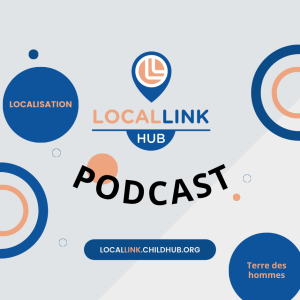
Wednesday Dec 04, 2024
Wednesday Dec 04, 2024
Beyond the Master Servant Dynamic: Degan Ali on Localization and Decolonization
In this powerful episode of the LocalLink Hub podcast, Degan Ali, executive director of Adesso and co-founder of NEAR Network, provides a profound critique of power dynamics in international aid. Drawing from her personal experiences as a Somali-American humanitarian leader, Ali dissects the complex issues of localization and decolonization in the aid sector.
Ali distinguishes between localization—moving money and leadership roles to local actors—and decolonization, which challenges the fundamental structures that create aid dependency. She argues for a radical reimagining of international NGOs, suggesting they should:
- Deeply reflect on their future relevance- Invest in building local organizational capacity- Create truly equitable partnerships- Reduce their direct operational presence- Share funding and decision-making transparently
The conversation explores the significant barriers global south organizations face, including limited resources, short-term project funding, and language limitations. Ali advocates for local organizations to gain financial sovereignty and for global south governments to set stronger conditions for international aid.
Her vision for the next decade includes local organizations becoming more united, international NGOs integrating localization principles into their core DNA, and ultimately sunsetting initiatives like the Pledge for Change by 2030 because equitable practices have become standard.
A must-listen for anyone interested in humanitarian aid, global development, and systemic change.
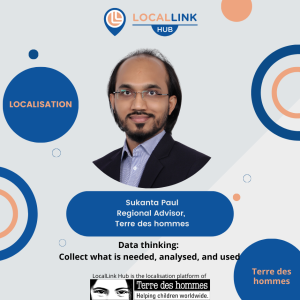
Monday Oct 07, 2024
Monday Oct 07, 2024
Explore data collection and analysis for small NGOs with LocalLink Hub's second data related podcast. In this episode, host Enikő Vass interviews Sukanta Paul, Regional Quality and Accountability Advisor at Terre des hommes, about effective methods for gathering and utilizing data in community-based projects.
Key topics include:
Quantitative and qualitative data collection methods
Technology's role in transforming data processes
Recommended tools and software for NGOs
Ethical considerations in data collection
Challenges faced by smaller organizations
Discover practical insights and tips to enhance your organization's data practices. Listen now to empower your projects with data-driven decision-making!
Sukanta Paul shares real-world examples from his experience, including innovative approaches like photovoice used in action research on child labour. He emphasizes the importance of ethical data collection, particularly in emergency contexts, and discusses how smaller organizations can overcome resource limitations to effectively manage data. The episode also touches on the critical balance between collecting necessary data and avoiding overburdening staff, offering valuable strategies for prioritization and efficiency.
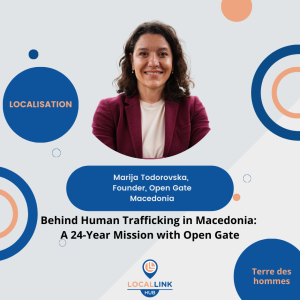
Wednesday Sep 11, 2024
Wednesday Sep 11, 2024
Marija Todorovska from Open Gate La Strada, North Macedonia, is our guest on the 4th episode of our podcast series. Marija is a leader in the fight against human trafficking. She has set up helplines, shelters, and advocates for the rights of victims. She also works as a consultant and trainer, sharing her knowledge on human rights, gender-based violence, and refugee protection.
In this episode, we talk about Open Gate's 24 years of work to protect victims of human trafficking and prevent it from happening. Over these years, the NGO has made great progress, but they still face many challenges. For example, after 10 years of constant advocacy, Macedonia passed a law in 2022 to compensate victims of crime, including those affected by human trafficking.
Open Gate established a shelter for trafficking victims in 2005, and it now operates in partnership with the Ministry of Labour and Social Policy. The shelter is expanding, and they hope to provide separate spaces for children, as well as support for male victims.
Marija shared some alarming facts about human trafficking. Of the victims they have helped, 60% are children aged 10 to 17, and sadly, this age is dropping each year. Even more troubling, 40% of the traffickers are family members or people known to the victims. The typical victim is a girl, often from marginalized communities like the Roma population.
Despite the challenges, Marija and her team are committed to their work. Not long ago, a woman who had been part of their program in 2009 returned to offer her help. Now living a happy life, she is a powerful reminder of the impact of Open Gate's work and why it must continue.

Wednesday Jul 10, 2024
Wednesday Jul 10, 2024
In this episode of the LocalLink Hub podcast, Enikő Vass, the communications and content manager for Local Link Hub, talks about the significance of monitoring, evaluation, accountability, and learning (MEAL) in NGOs with Mariela Lazi, a Regional Quality and Accountability Advisor for Terre des hommes in Europe.
In this podcast about the basics of MEAL Mariela Lazi explains that MEAL stands for Monitoring, Evaluation, Accountability, and Learning, which evolved from the older term, M&E (Monitoring and Evaluation). MEAL includes accountability to donors and beneficiaries and emphasizes continuous learning to improve project outcomes.
Mariela discusses how, in the past, local NGOs often included monitoring and evaluation within project coordination tasks rather than having a separate unit. However, having a dedicated MEAL team is crucial to avoid bias and ensure objective evaluation of projects. She notes that the capacity to carry out MEAL tasks varies among local NGOs, and there is a growing need for strong capacity-building efforts.
The practical challenges of implementing MEAL
The conversation touches on the practical challenges of implementing MEAL. Projects must be designed with clear, measurable goals to facilitate effective monitoring and evaluation. The unpredictability of NGO work makes it even more essential to have well-defined plans and adaptable strategies.
Mariela also emphasizes the importance of independence and decision-making power for MEAL professionals within NGOs. They must be able to voice concerns and highlight issues objectively, without pressure from project implementers. This helps ensure the effectiveness and impact of projects.
Good practices in the sector include a growing desire for capacity development among local organizations and the establishment of dedicated MEAL units. Mariela advises NGOs to strengthen their MEAL structures and allow MEAL professionals to operate independently to maintain accountability and improve project outcomes.
In closing, Enikő Vass thanks Mariela Lazi for her insights and invites listeners to learn more about Terre des hommes initiatives and contact the podcast team with feedback or comments.
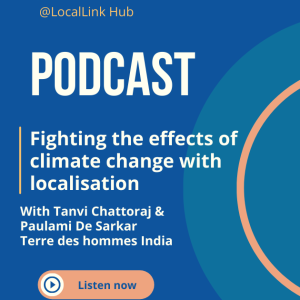
Tuesday Jun 11, 2024
Tuesday Jun 11, 2024
Figthting the effects of climate change with localisation
In this podcast episode, Enikő Vass interviews Tanvi Chattoraj and Paulami de Sarkar from Terre des hommes (Tdh) India about the Local Link Initiative, which officially launched in India on May 1st. 2024. They speak about the Sundarbans, a region severely affected by climate change, and emphasize empowering children and communities through participatory methodologies and safeguarding measures.

Tuesday Apr 16, 2024
Tuesday Apr 16, 2024
In our podcast, we discuss with Martin Gallard, localisation project manager at Tdh, what counts as indirect costs, the structural barriers around them. We suggests three models that could be applied to indirect costs - participatory grant making, pooled funds and the smart way of doing things. And finally, we spend some imaginary money granted to us by a fairy on indirect costs.







